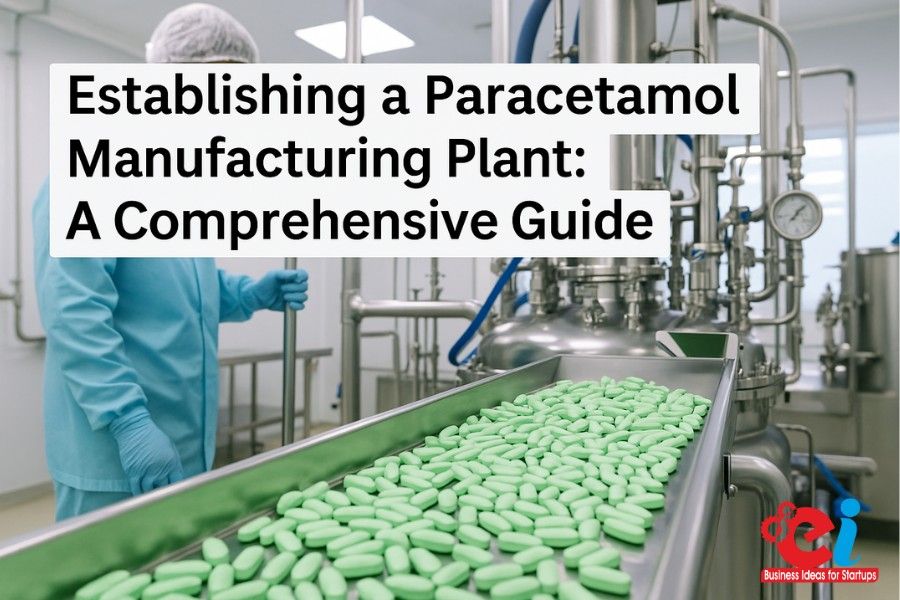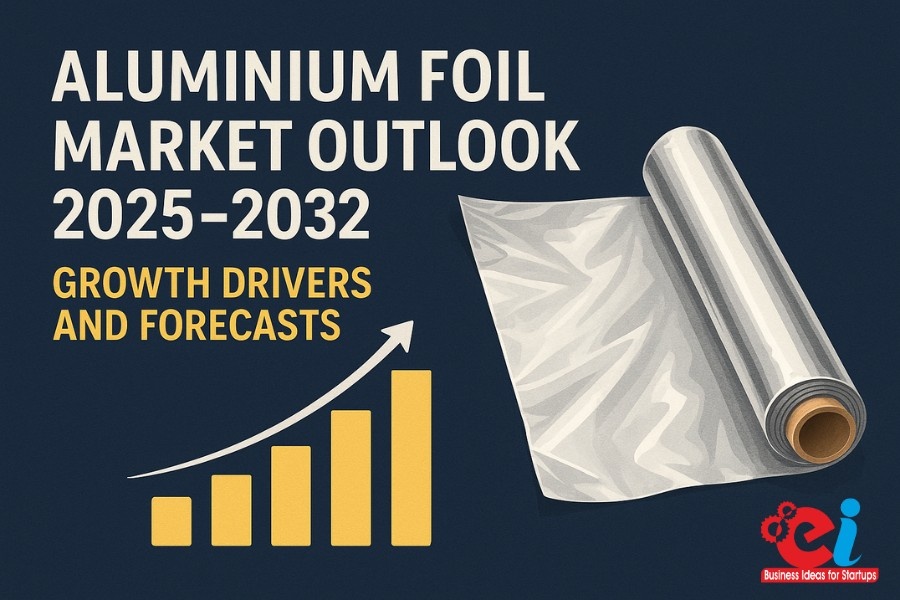Paracetamol, or acetaminophen as it is known in some regions, is one of the most common over-the-counter medication used for pain relief and fever. Its applications range from minor headaches to post-operative pain and even flu-like symptoms which, in turn, leads to a global demand for it. This explains why establishing a paracetamol manufacturing plant seems like a good idea for pharmaceutical investors, entrepreneurs, and other medicine companies wanting to diversify. With the omnipresent opportunities in the domestic and international markets, coupled with the low Indian manufacturing costs and skilled workforce, the country stands to benefit from being a hub for producing medicines.
Understanding the Demand for Paracetamol
The strong demand and need for the medication make Paracetamol a household name, cutting across every socio economic class. Growing awareness about health care, rising incidences of fever and common illnesses, infections and a recent surge in self-medication boom has set the growth of the global paracetamol market to over USD 9 billion in 2022, with steady growth expected in the future. In India, paracatamol is one of the top five consumed pharmaceutical products which brings in revenue from retail pharmacies, hospitals, institutional sales and exports. Moreover, in the wake of recent health crises like COVID-19, the relevance of paracetamol as a supportive treatment has further fueled its consumption.
A vertically integrated paracetamol manufacturing plant can optimize profitability and maintain quality control due to the high demand for both the active pharmaceutical ingredient (API) and the finished dosage form, such as tablets or syrups.
Factors to Consider When Choosing a Site for Construction and Plant Setup
Pharmaceutical manufacturing unit setup entails multiple decision-making steps. Location is always fundamental concerning logistical optimization and raw material access. Equal attention must be directed to regulatory compliance and human resources. The state of Gujarat, as well as the other growing pharmaceutical clusters in Maharashtra, Telangana, Himachal Pradesh, and other regions have industrial hubs with developed infrastructures along with reliable sources for utilities like purified water, power, and waste treatment facilities.
Pharmaceutical plants should design the layout in such a way that there is an orderly process flow as well as compliance to the Good Manufacturing Practices (GMP) set forth by the WHO and other local bodies. There needs to be demarcated zones for raw materials reception, production, quality control, packing, and warehousing. Also, HVAC (heating, ventilation, and air conditioning) units for clean and contamination-free environments underscored by cross-contamination prevention measures.
NPCS has offered comprehensive project implementation planning support to clients looking to establish pharmaceutical manufacturing plants, including customized plant layout design and technological background setup.
Process of Paracetamol Manufacturing
In a general sense, the process for paracetamol can be split into two segments: API (Active Pharmaceutical Ingredient) production and formulation into a final dosage form (tablet, syrup). API production entails chemical synthesis, which in this case uses phenol nitration to produce para-nitrophenol that undergoes reduction to para-aminophenol, which gets acetylated to paracetamol. Advanced reactors, filtration, and drying systems are needed in this step to provide high purity and yield.
In formulation, the API is blended with excipients that include binders, disintegrants, and fillers. Syrup is formed through mixing and filling machines while the blend is compressed into tablets using tablet press machines. Automated lines perform the tablet blister and bottle filling packaging to maintain hygiene and efficiency.
All the production steps undergo validation to ensure compliance with drug regulations which incorporate specific details like labeling and documentation. NIIR Project Consultancy Services aids its clients with developing SOPs and conducts process validation studies to meet compliance requirements.
Related: Business of Paracetamol (Acetaminophen) API
Needed Machinery and Equipment
For the plant that processes paracetamol, a blend of sophisticated machinery alongside general pharmaceutical equipment is required. For API production, the following equipment is instrumental:
- Glass or stainless steel reactors.
- Centrifuges
- Crystallizers
- Dewatering rotary vacuum or tray dryers
- Distillation apparatus
- Water and effluent treatment plants
For mass tablet production, the following machinery is typically required:
- Coating machines.
- Punch tablet presses
- Granulators and mass mixers
- Dryer fluid beds
- Blister packing
- Capsule filling (if extending product range)
In addition to these items, clean room space, QC laboratories, HVAC equipment, and utility services are vital for business operations.
Irrespective of the scale of operations, NIIR Project Consultancy may be contacted for comprehensive lists of equipment, suppliers, and procurement strategies relevant to the client’s compliance requirements and intake budget.
Licensing And Regulatory Approvals
A comprehensive set of industry regulations governs the erection of a paracetamol manufacturing plant. In India, both the Central Drugs Standard Control Organization (CDSCO) and the State Drug Control office give mandatory approval. Other important regulatory approvals include:
- Drug Manufacturing License (Form 25/28)
- GMP Certification
- Environmental Clearances by the Pollution Control Board
- Fire and Municipal Permits
- Certification from International organizations like WHO-GMP, EU-GMP, or even USFDA can significantly improve the export value.
Step-by-step assistance in acquiring these licenses alongside documentation preparation and facility audits is provided by NIIR Project Consultancy.
Investment and Financial Planning
The cost incurred for establishing a paracetamol plant differs with the capability and extent of units integrated in the organization. A small scale plant that is only tablet based and outsources API could bare an initial cost of ₹3-5 crore. On the other hand, integrated fully automated and highly capacitated API plus formulation plants may go beyond ₹25-50 crore. Investments put in land and building, machinery and equipment, utilities, working capital, labor contracts, and even anticipated expenses are considered the key cost factors.
Financial analysis metrics like IRR (Internal Rate of Return), breakeven period, and ROI (Return on Investment) require thorough consideration. NIIR Project Consultancy Services provides investors with comprehensive financial modeling, bankable feasibility studies, and project viability analyses. Their documentation features robust cost–value assessments, future balance sheet projections, cash flow models, and profit estimations for up to 10 years.
Related: List of Profitable Business Ideas in Medical Healthcare Industry
Raw Material Sourcing
The availability and quality of raw materials greatly affect the safety and consistency of paracetamol safety. The primary raw materials for the API synthesis include phenol, acetic anhydride, nitric, and reducing agents like hydrogen or iodine. For formulation, pharmaceutical-grade excipients microcrystalline cellulose, starch, and magnesium stearate are required.
India has an established foundation for the chemical manufacturing industry. However, there may be an import reliance for some critical raw materials such as acetic anhydride or phenol. It is suggested to establish supply chain agreements with trusted suppliers and plan for inventory stockpiling. NIIR Project Consultancy Services can help with establishing supplier relationships and setting up raw material quality assurance procedures.
Assurance and Compliance
In the case of paracetamol manufacturing, assurance of maintaining product quality, uniformity, and compliance with specified pharmacopeial standards such as IP, BP or USP cannot be compromised. There should be a powerful Quality Assurance (QA) and Quality Control (QC) system to evaluate raw materials, in-process batches, and finished goods.
Analyzing methods of HPLC, UV spectrophotometry, and dissolution testing are commonplace. Digitally maintained batch records, equipment logs, and deviation reports should allow for complete traceability. Compliance audits along with staff training on GMP standards are mandatory for safety and regulatory compliance.
NIIR Project Consultancy Services has developed specialized documentation guides, employee training tools, and internal audit checklists designed to guarantee that your plant consistently remains in regulatory compliance.
Strategic Approach to Packaging and Distribution
Packaging fulfills Paracetamol’s primary branding, dosage clarity, and regulatory functions alongside product safeguarding. The product’s form determines the packaging type; Paracetamol comes in tablets stored in plastic bottles or blister strips, with syrup variants in amber glass or PET bottles. Packaging that is child-proof, moisture-proof, and tamper-proof is highly recommended.
Business models that prioritize the hospital supply chain, retail pharmacy distribution, or exports have unique distribution channels. Operational costs can be greatly reduced as a result of incorporating temperature-controlled transport management, warehousing, and inventory control systems into the logistics management framework.
In India and internationally, NIIR Project Consultancy offers assistance with vendor selection for packaging, network planning for logistics, and forming distribution alliances.
Evaluating Sustainability and Environmental Impact
A plant’s design must incorporate environmental sustainability practices for any chemical-based production process. Employing effluent treatment plants (ETPs), air filters, and solvent recovery systems minimizes ecological impact. Ensuring compliance with state and central pollution control policies maintains business continuity and fosters community goodwill.
The shift toward focusing on ESG (Environment, Social, and Governance) metrics enhances focus on the adopting green chemistry, waste mitigation, energy-efficient practices, and impact policy incentives from the state and investors.
NIIR Project Consultancy Services assists with environmental audits, EIA studies, and Paracetamol Manufacturing practices for the pharmaceutical sector.
What Makes NIIR Project Consultancy Services Ideal for Your Paracetamol Business?
NIIR Project Consultancy Services is well-known for its industrial project consultancy services. We have more than 40 years of experience in preparing Market Survey cum DPR, comprehensive project reports, as well as individual project profiles for MSME’s and corporate clients, market research reports, and business plans.
Whether you are an investor looking into the pharmaceutical sector for the first time or an industry player seeking to expand your facilities, NPCS provides:
Tailored workmanship for a Paracetamol API or Paracetamol API formulation plants.
Assistance with compliance, plant setup, and environmental licensing.
Machinery, raw materials, and utilities vendor partnerships.
Paracetamol manufacturing project’s financial modeling, investor presentation, and consultancy.
Marketing export strategy alongside market scope expansion guidance.
Conclusion
With significant social and economic benefits, pursuing a paracetamol manufacturing plant can be incredibly fulfilling. In light of increasing domestic and international needs, the market presents ample opportunities for expansion. The government also provides support through programs such as ‘Make in India’ and the Production Linked Incentive (PLI) schemes. However, success in this field requires thorough planning, regulatory compliance, strict quality control, and ongoing optimization of processes.
Engaging with professionals at NIIR Project Consultancy Services (NPCS) that provide startup-specific Techno-Economic Feasibility Reports, market studies, plant establishment assistance, financial forecasts, and even full consulting services can be a game changer for entrepreneurs and investors alike. NPCS can guide you through every stage of the process, from initial setup to expansion, as they provide comprehensive assistance for paracetamol manufacturing projects.

















